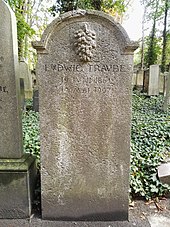Ludwig Traube (philologist)
Ludwig Traube (born June 19, 1861 in Berlin , † May 19, 1907 in Munich ) was a German classical philologist , medievalist and paleographer . He held the first professorship for Middle Latin in Germany at the Ludwig Maximilians University in Munich .
Life
Traube was born in Berlin to a Jewish family; his father was the doctor and pathologist Ludwig Traube . After graduating from the Askanisches Gymnasium in Berlin in 1880, he studied classical philology and medieval studies at the universities of Munich and Greifswald . In 1883 he received his doctorate in Munich; his dissertation Varia libamenta critica dealt mainly with the sources of Macrobius . In 1888, Traube completed his habilitation with studies on the poetry of the Carolingian era and taught in the following years as a private lecturer. In 1902 (not 1904) he was appointed full professor of Latin Philology of the Middle Ages. Traube, married to a daughter of the sinologist Friedrich Hirth since 1900 , died of leukemia in 1907.
In 1894 he was elected a corresponding member of the Göttingen Academy of Sciences . Since 1896 Traube was an extraordinary member, since 1899 a full member of the Bavarian Academy of Sciences , since 1902 a member of the Accademia dei Lincei . From 1897 to 1904 he was a member of the central management of the Monumenta Germaniae Historica (MGH), where he was in charge of the Auctores Antiquissimi and Antiquitates departments.
Traube mainly dealt with the Latin literature of the Middle Ages, palaeography and the history of texts and traditions of Latin authors. Together with Wilhelm Meyer , who worked in Göttingen , Traube is considered to be the founder of the Latin philology of the Middle Ages.
He is buried in the Jewish cemetery at Schönhauser Allee . Traube's estate included his important private library, which contained prints, manuscripts and photographs from manuscripts and was supported by friends with annual financial support during his lifetime. After his death, four codices and around 60 manuscript fragments were acquired from the Munich State Library; the rest of the holdings went to the MGH Central Management as a foundation and today forms the basis of the Monumenta Library.
Fonts
- Carolingian seals. Ædelwulf, Alchuine, Angilbert, Rhythms . Weidmann, Berlin 1888.
- O Roma nobilis. Philological studies from the Middle Ages . Munich 1891.
- Scribe Lotharius by S. Amand . In: Zentralblatt für Bibliothekswesen , Vol. 9 (1892), pp. 87-88 ( online ).
- Text history of the Regula S. Benedicti . Munich 1898.
- The history of the Tironic notes in Suetonius and Isidorus . Berlin 1901.
- Review of my teaching . Munich 1901. Reprinted by Arbeo-Gesellschaft, Munich 1988.
- Nomina Sacra. Attempt a history of Christian shortening . Beck, Munich 1907. Reprint Scientific Book Society, Darmstadt 1967.
- Lectures and treatises . 3 volumes. 1909-1920. (Volume 2: Introduction to the Latin Philology of the Middle Ages ).
literature
- Wolfgang D. Fritz: Theodor Mommsen, Ludwig Traube and Karl Strecker as employees of the Monumenta Germaniae historica. In: Das Altertum 14 (1968), pp. 235–244.
- Albert Lehner (ed.): Latin culture in the eighth century. Grape memorial . EOS-Verlag, St. Ottilien 1989, ISBN 3-88096-695-8 .
- Tino Licht: Ludwig Traube's traditional philology. In: Materiale Textkulturen , ed. by Th. Meier u. a., Berlin a. a. 2015, pp. 183-190
- Christel Meier : Queen of the auxiliary sciences? Reflections on the history, self-image and future of Middle Latin Philology. In: Frühmittelalterliche Studien 35 (2001), pp. 1–21 (especially pp. 5–8).
- Arno Mentzel-Reuters : Ludwig Traube and the Monumenta Germaniae Historica. In: Journal for Bavarian State History , Volume 77, 2014, pp. 3–25.
- Gabriel Silagi: Ludwig Traube and the Munich Chair for Patristics (with an excursus on the thesaurus question). In: Aevum 73 (1999), pp. 837-890.
- Georgios Fatouros : GRAPE, Ludwig. In: Biographisch-Bibliographisches Kirchenlexikon (BBKL). Volume 12, Bautz, Herzberg 1997, ISBN 3-88309-068-9 , Sp. 432-434.
Web links
- Literature by and about Ludwig Traube in the catalog of the German National Library
- Works by and about Ludwig Traube in the German Digital Library
- Short biography with picture
- Employee site at Monumenta Germaniae Historica
- Arno Mentzel-Reuters (Ed.): Catalog of the Traube Library , MGH 2006 (PDF, 8 MB), digital copies from the holdings of the library are listed in the online catalog of the MGH library
Individual evidence
- ↑ Holger Krahnke: The members of the Academy of Sciences in Göttingen 1751-2001 (= Treatises of the Academy of Sciences in Göttingen, Philological-Historical Class. Volume 3, Vol. 246 = Treatises of the Academy of Sciences in Göttingen, Mathematical-Physical Class. Episode 3, vol. 50). Vandenhoeck & Ruprecht, Göttingen 2001, ISBN 3-525-82516-1 , p. 242.
| personal data | |
|---|---|
| SURNAME | Traube, Ludwig |
| BRIEF DESCRIPTION | German classical philologist, medievalist and paleographer |
| DATE OF BIRTH | June 19, 1861 |
| PLACE OF BIRTH | Berlin |
| DATE OF DEATH | May 19, 1907 |
| Place of death | Munich |

